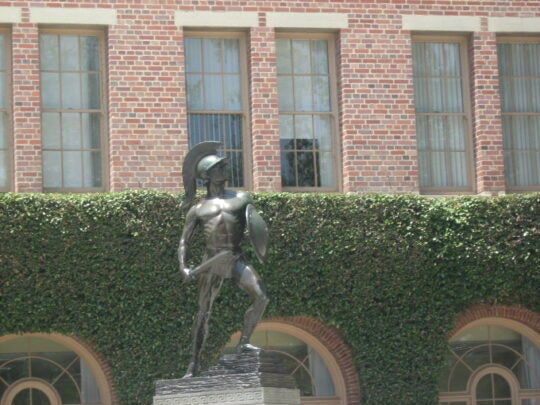English Literature Ph.D. Requirements
The English department encourages its graduate students to design individual programs of study, choosing from among a range of courses in English and in other departments. To this end, the structure of the Ph.D. emphasizes faculty guidance rather than formal requirements. Upon enrollment in the graduate program, each student is assigned to a faculty mentor; as the student’s interests take shape, she or he may choose another adviser at any time. The following sections outline the stages of the typical graduate student progress.
-
In their first semester, all students take English 501: Introduction to Graduate Study: Critical Methods and Practice I, a team-taught seminar which introduces them to theories and methods of criticism, as well as to major issues and debates in the profession. Thereafter they may select from the 15-18 graduate seminars offered each year in English, as well as seminars offered by programs such as Comparative Literature (COLT), History, Gender Studies, Critical Studies (CNTV), and the Program in American Studies and Ethnicity (PASE). [The “Courses” button on the main menu will take you to descriptions of current and typical graduate seminar offerings.]
- A normal courseload consists of 8-12 units (two or three 4-unit seminars) per semester.
- Students may transfer no more than 12 units of graduate coursework from other institutions.
- Two-thirds of the coursework required for the PhD must be taken within the Department of English.
-
During the first term of the second year, students undergo the departmental Screening Procedure. This is not a formal examination. Rather, the Director of Graduate Studies reviews each student’s performance during the first year and, if necessary, communicates concerns to the student and to the student’s faculty advisor. Successful screening is communicated to the student by letter. Successful screening and the completion of 30 units of coursework fulfill the requirements for the terminal Master’s degree.
-
The Field Examination must be taken in the semester immediately following the completion of coursework; the completed exam must be submitted to the committee chair by no later than December 1 (for fall exams) and May 1 (for spring exams).
1) The Field Examinations are designed to help students develop a mastery over three fields of critical inquiry before they begin the process of preparing for the Qualifying Examination and the dissertation prospectus.
2) Students will make an appointment with the Director of Graduate Studies in their final semester of course-work in order to establish a committee of three examiners who will set and grade the Field Examinations in the following semester. The student will choose the examiners. The Director of Graduate Studies must approve the choice. One committee member will serve as chair. One member of the fields committee may, upon occasion, be from another department. This request should be made on a case by case basis and will be up to the discretion of the DGS. Once approved by the DGS, the composition of the committee cannot be changed within the semester in which the exam will be taken.
3) The student will choose three fields. The student will select one examiner per field to preside over the exam process and to help with devising the question and reading list. Two fields must be chosen from:
i. (a) Medieval or (b) Early Modern
ii. (a) Long Eighteenth Century or (b) Long Nineteenth Century, Romanticism, Victorian
iii. (a) Early Twentieth Century or (b) Post-World War II
The third field is a free choice and may be any of the above, including another alternative from the four listed (for example, Medieval in addition to Early Modern) or from one of the areas listed below:
i. (a) Critical Theory or (b) Area Studies
Area studies may be any one of the following:
-
- Literatures of the US-Mexican border and Latin America
- Afro-American Literature and African Diaspora
- Asian-American Literature and the Pacific Rim
- Literatures of the Circum-Atlantic World
- Media, Film and Popular Culture
- Media and Sound Culture
- Genre studies across historical periods (Romance, Memoir, Travel Narrative, Gothic etc.)
- Native American Literatures
4) The student will, in consultation with the presiding examiner, develop a bibliography for each of the three fields. The suggested length of each bibliography is 25 to 30 works, divided as the examiner advises among primary and secondary sources.
5) The student and the presiding examiner will together formulate a question for each field. The question must be comprehensive and applicable to many works, but will invite the student to respond in terms of three to five representative works from each list. The question for each field must be different from those for the other two.
6) The student and committee will set a due date for the examination, which again must be no later than December 1 (for fall exams) and May 1 (for spring exams). The student must complete the exam within a 10 day window of time.
7) Each question will be answered in an essay of no fewer than 1500 words and no more than 3000 words. The three examiners will read all answers, but each will assign a grade only to the examination over which he or she has presided. The grade may be Pass or Fail. The committee chair will collate the grades and, after consultation with the other examiners, assign an overall grade of Pass or Fail. A student who fails the examination may retake it once only, in the semester immediately following the one in which it was first attempted, with the same committee of examiners (unless an exemption is granted, in exceptional circumstances only, by the Graduate Studies Committee). The examining committee may determine that the student will have to retake one, two, or all three fields.
8) Each examiner will write a report of approximately one page detailing the strengths and weaknesses of the answer that he or she graded. The Committee Chair will then write a final report summarizing these responses to the student’s performance and suggesting avenues of inquiry that could be pursued in the Ph.D. dissertation. Copies of the final report will be sent to the student and the DGS; these reports are due by that semester’s deadline for grade submission.
The committee chair is responsible for: coordinating the questions with the student and the other examiners; coordinating the scheduling with the student and the other examiners and reporting it to the Director of Graduate Studies; proctoring the examinations electronically; reporting the grade on the provided sheet to the Director of Graduate Studies by the university’s grade submission deadline; writing a final report on the examinations.
-
-
One term before they take the qualifying examination, students should also have fulfilled the foreign language requirement. Demonstration of proficiency in an appropriate foreign language may be met in several ways, such as designated coursework or a translation exam.
Some students will enter the program with sufficient foreign language skills for their course of study (e.g. either compelling evidence of literate knowledge of a language other than English, such as a high school degree from a school in a non-English speaking country, or four or more semesters at the college level of a language other than English with a grade of B or better in the last semester, or its equivalent). In lieu of sitting for a foreign language exam, these students may present a written petition to the faculty members of the Graduate Committee, who will decide by vote whether to accept the petition or recommend some other course of action for filling the language requirement. Requirements for having the petition granted could include transferred coursework in the language, though work done more than five years before entering the program cannot be accepted. Students should also make a case for why and how this particular foreign language will be relevant, or more relevant, to their course of dissertation study than another language they have yet to study. The department reserves the right to require a particular language on the grounds of relevance to future research.
-
Students must take the departmental Qualifying Examination in the first or second semester following their successful completion of the Field Exams. Students form a committee of at least five tenured or tenure-track faculty members, at least three of whom must be from the Department of English, at least one of whom must be tenured and one of whom must be from outside the department. (Faculty with a joint or courtesy appointment in English cannot act as outside readers.) One faculty member from English will agree to chair the committee. To take the qualifying exam, the student will first sit a three-hour on-campus examination in which he/she will be asked to produce one of the following three documents: a 500-word abstract of the prospectus; a list of three questions the student would ask himself/herself about the prospectus; a syllabus for a class as inspired by the prospectus. No more than two weeks after the completion of the written examination, the student will sit a two-hour oral examination that will be attended by all committee members. The oral exam will encompass the written exam, the prospectus, and the accompanying bibliography. After passing the qualifying examination, the student will reduce the guidance committee to three or four members, who will include the director and the outside reader. Led by the director, this committee will oversee the student’s Ph.D. dissertation. English 700: Theories and Practices of Professional Development I, offered yearly, is an elective 2-unit seminar designed for students preparing to take the qualifying exam. Its goal is to facilitate the writing of the dissertation prospectus and the creation of the reading list.
The last date in the fall semester that written exams will be given in November 15, and the last day of the spring semester is April 10. No exams will be given over the summer.
Download the Appointment or Change of Qualifying or Dissertation Committee forms
-
The dissertation is a book-length manuscript that makes an original and substantial contribution to its field of study. Its substance, style, and format must meet professional standards of research. (The requirements for students in the Literature and Creative Writing track are different, since these students produce both a creative project and critical thesis. Page-length requirements are specified on the Literature and Creative Writing page.) Upon submission of an acceptable manuscript and a successful oral defense, the student will be awarded the Ph.D.



Additional Resources
For information about the Ph.D. in Creative Writing and Literature, please click here.
For additional details on departmental and university requirements, see the university catalogue.
Contact Details
USC Department of English
3501 Trousdale Parkway
Taper Hall of Humanities 404
Los Angeles, CA 90089-0354
Office Hours
Monday – Friday
8:30am- 5pm
Times may adjust in accordance with university holidays.